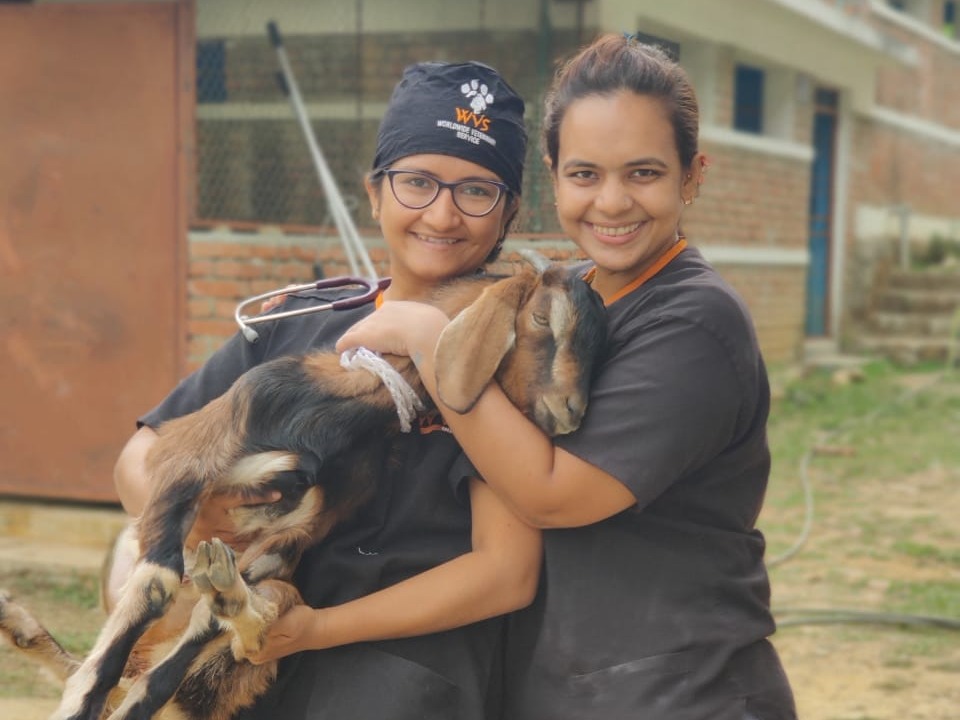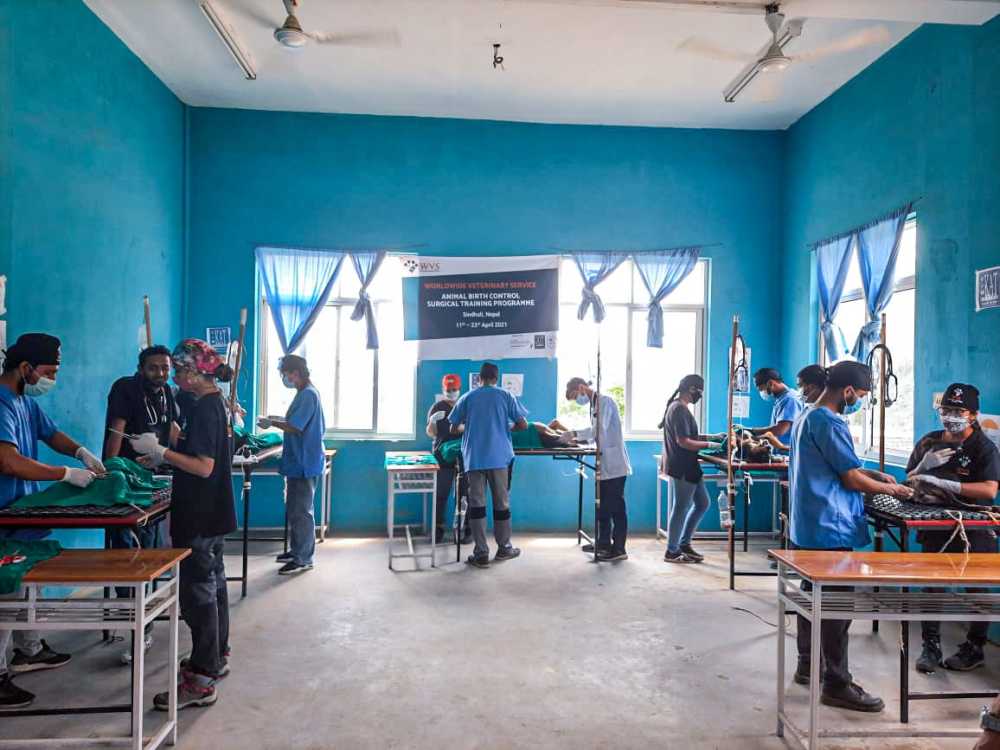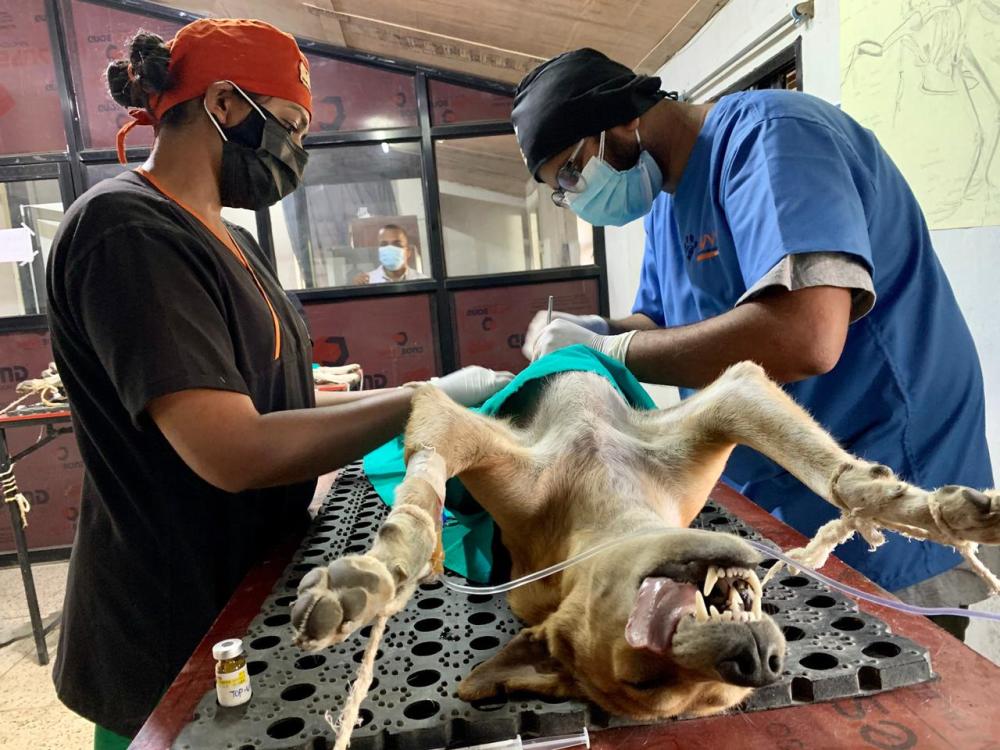In Nepal, the WVS Taskforce was on a mission to deliver surgical training to vets in areas that need it the most.
In less than four weeks, the team transformed local classrooms into operating theatres and kennels to upskill 16 vets and 14 veterinary assistants in surgical skills and animal welfare best practices. Under the guidance of our experts and with the help of our animal handlers, the team managed to humanely spay-neuter 195 dogs in rural areas.
It was here that we met “Kimbu” the goat.

The owner came to our vets with his concerns about a large mass near Kimbu’s groin, which he had lived with since birth. With no veterinary intervention, the mass had caused immobility problems and even deformation of Kimbu’s leg over the years.
Midway through the surgical training course, when our teams had a rest day, they decided to examine Kimbu and see what they could do to help the poor goat.
Dr. Amanda from the WVS Taskforce led the team.
Step One: Examination
“On palpation, I realized that this was an inguinal hernia. All of Kimbu’s intestines were lodged in the hernial sack through the inguinal ring.”

“Kimbu never received the surgical attention this condition needed due to the lack of skilled surgeons who could operate on him. We decided to perform a hernia reduction and repair surgery for him.”
Step Two: Surgery
“Formulating an anaesthetic cocktail was a challenge, which we overcame by carefully planning the protocol with the available drugs. Kimbu was sedated with Xylazine, induced, and maintained with Diazepam and Ketamine. We gave him a pre-op antibiotic shot as well as Meloxicam.”

“Whilst in surgery, all the herniated contents were reduced back into the abdomen from the inguinal ring. Kimbu was simultaneously castrated at this time. We closed the muscle with 2-0 PDS in a simple interrupted pattern. The skin was closed with a simple interrupted pattern as well. Kimbu had developed bloat as a result of the long recumbency and with the use of xylazine, we used a trochar and cannula to relieve his bloat post-op.”

Pictured below: Kimbu's large protruding mass that was surgically removed.

Step Three: Recovery
“To our delight, he recovered beautifully from anaesthesia and began eating grass the very next day! Noticeable ease and comfort were observed in his gait (walk) as he didn’t have to lunge around everywhere with a hernia.”

The surgery not only changed Kimbu’s life for the better but showed to the local vets and veterinary assistants undergoing training the importance of vet care.
“We demonstrated to the participants that after acquiring basic surgical and anaesthetic knowledge, they can perform life-saving surgery in different species of animals and improve their quality of life greatly. I feel happy that I was able to treat Kimbu and this was my best memory from Nepal!”
Nepal: A Taskforce Mission
Why were we in Nepal? The WVS Taskforce was on a mission to deliver surgical training to support organisations in animal welfare.

With all the equipment, supplies, and education material packed into a truck, they set off to the Sindhuli District of Bagmati province and then to Paklihawa in Lumbini province to upskill local professionals and improve the standard of care animals receive – wherever they are found.

Thank You
This mission work driven by the WVS Taskforce wouldn't be possible without the support of our local and global partners.
Thank you to Marchig Trust for your ongoing support, and to the Kathmandu Animal Treatment Centre for your partnership. We're so grateful to our animal handlers, dog-catchers, and skills vet assistants for their tireless efforts in making the training programme a success, and to the Sindhuli Community Technical Institute, our host organisation, for their hospitality.
In the future, the WVS Taskforce is set to deliver its life-saving programmes in Africa. This expansion is thanks to the support of our new partners at the IDEXX Foundation.
Related Content
The mission in Nepal is just one of the many outreach projects our veterinary teams undertake every year. Visit WVS News for more about our work in rural settings – everywhere from populated islands in Tanzania to wildlife reserves in Malawi.